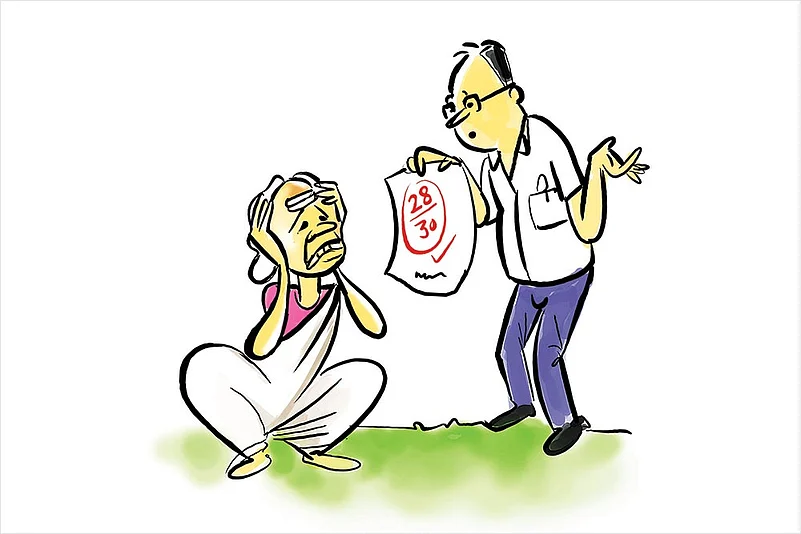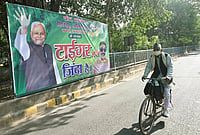Granny’s Grades
Imagine getting 98 out of 100 in an exam and being unhappy about those two marks. It’s a condition that seemingly afflicts even nonagenarian great-grandmothers. That’s right—96-year-old Karthyayani Amma, a resident of Kerala’s Alappuzha district, recently received the results for the literacy exam that she took in August; she passed with flying colours, scoring 40 out of 40 in writing, 30 out of 30 in reading and a shocking 28 out of 30 in mathematics. Karthyayani Amma is a former temple sweeper who never went to school and had apparently never held a pen in her life before she started preparing for this exam. She’s among the 42,933 people (out of 43,330 candidates) who have passed the exam, which was held as part of the state government’s Aksharalaksham programme, a bid to ensure 100 per cent literacy in the state.

Undated Date
A 15-year-old boy and a 60-year-old widow. An inspiring tale of intergenerational romance in defiance of a disapproving society? Not quite. The boy, a mason in Assam’s Goalpara district, dialled a wrong number one day, and the woman answered the phone. They spoke and soon began to have regular conversations—without ever revealing their ages. The boy fell in love with the “girl’s” voice, and one day decided to visit her at her home in Barpeta district. Naturally, he got a shock when he met his dream girl, and a bit more of a shock when her neighbours and relatives forced him to marry her. The woman reportedly objected to the marriage and said she had only befriended him because she enjoyed how he spoke. The State Commission for the Protection of Child Rights is investigating the incident.

Deadly Realism
Life imitates art, and sometimes gets too close for comfort. In the 2017 film Newton, which looks at elections in Chhattisgarh’s Bastar region—an area with a strong Maoist presence—local resident Mangal Kunjam played the role of a journalist with brief screen time. He’s a journalist in real life too, and he probably won’t be voting in the upcoming state assembly elections. Why? Because his life is in danger from Maoist insurgents, who have called for a boycott of the polls. “I will not vote and neither will other people in my village, following the call by the Naxals to boycott elections,” Kunjam was quoted as saying. He added that he had learned from his experience of voting in 2013, after which he was summoned by an insurgent commander and warned that he would be killed if he dared to vote again.

Regal Manners
It’s quite a scene to picture: a former chief justice kneeling to receive ‘tilak’ from an enthroned president. That’s what happened in Kathmandu on Vijayadashami, when a retired chief justice of Nepal’s Supreme Court, and other government officials, called on President Bidhya Devi Bhandari at her house. She applied the tilak—or ‘tika’—to the supplicants’ foreheads while sitting on a high chair. Pictures of the event went viral and provoked criticism, with a bureaucrat saying, “Why should the head of a secular state maintain royal tradition and treat people...as subjects?” Not one to be outdone, PM K.P. Oli opened his official residence and offered the same beneficence on the day, in a manner condemned as “feudal” by ex-PM Baburam Bhattarai.

Dirty Payments For The Poor
You can be a billionaire and poor in Pakistan. No, it hasn’t turned into Monaco, nor does it have a case of the Weimars. It’s a prosaic money laundering scheme: skim money off public contracts, transfer it to an account in the name of an unfortunate, empty the account and launder the money abroad. Take the case of a rickshaw driver who—having just saved Rs 300 to buy his daughter a bicycle—learned that Rs 3 billion had passed through an unused account in his name. A call from the federal investigation agency gave him the jolt, and was persuaded to cooperate with the probe. “This is your stolen money,” PM Imran Khan said, addressing the issue.
Abode Under The Hammer
Home, crumbling home. The family residence where Myanmar state counsellor Aung San Suu Kyi was imprisoned for 15 years—a dilapidated lakeside villa that belonged to her late mother, Khin Kyi—may come under the hammer. Suu Kyi’s estranged elder brother, US-based engineer Aung San Oo, has petitioned the Supreme Court for the property—worth $90m as per his lawyer—to be sold off and the proceeds to be shared. The house, which was given to Khin Kyi following the assassination of her husband, Aung San, in 1947, has a totemic status among Suu Kyi’s followers.
A Game Of Musical Mandates
Bhutan’s voters are building something of a reputation for themselves. In each of the three elections that have been held since democratisation—2008, 2013 and 2018—they’ve given a thumping mandate to a different party. This time, in the National Assembly (lower house) election on October 18, the Druk Nyamrup Tshogpa (DNT), which was formed only in 2013, won a decisive victory with 30 seats out of 47. Its leader, surgeon-turned-politician Lotay Tshering, is now prime minister-designate. Meanwhile, the runoff system meant that two of the four parties in the race—including the outgoing government—lost all their seats after being eliminated in the first round.

Voice Against Surrender
A minister in Imran Khan’s government has criticised its decision to appease Islamists, comparing it with the various pacts that various countries had made with Germany and that helped Hitler have his destructive way.
Protests by Pakistan’s Islamists that paralysed the country for days over the Supreme Court’s landmark verdict on Asia Bibi finally ended on November 3 after the government reconciled with the hardliners. But concerns were expressed by human rights minister Shireen Mazari on the price the government may pay in future for the appeasement.
Pakistan’s apex court ruled in favour of Asia Bibi, a Christian woman in the predominantly Muslim nation who was charged under Pakistan’s blasphemy law. A lower court had sentenced her to death for abusing Prophet Mohammed. But the SC overturned the verdict in a landmark judgment last month, sparking countrywide protests by the Islamists.
Mazari expressed concern through a tweet on Sunday, highlighting the dangers of “appeasing non-state actors”. According to Dawn, the minister also cited the example of the 1938 Munich pact, in which Britain and France told Nazi Germany they would not object to its annexation of parts of Czechoslovakia, thus abandoning the country to its fate.
Appeasement to “avoid bloodshed” sends a dangerous message to non-state actors and undermines the very concept of democratic peaceful protest. The state has to enforce Rule of Law, Constitution and stand by state institutions, especially when they are targeted.
She tweeted, “It is unfortunate we don’t study history —appeasement historically never works as Chamberlain’s Munich appeasement towards Nazis showed. Appeasement to avoid bloodshed in a war-weary Europe led to massive bloodshed & destruction in the form of WW II.” The Munich agreement hoped to achieve peace by putting up with Hitler’s rapacity for territory one last time, but in actuality appeased the strongman and further emboldened him. It achieved nothing: the Nazi-Soviet pact was signed in August 1939; the two dictators—Josef Stalin and Hitler—moved in to dismember Poland a week later, sparking off a global war, the most terrible ever known to mankind.
Illustrations by Saahil






















